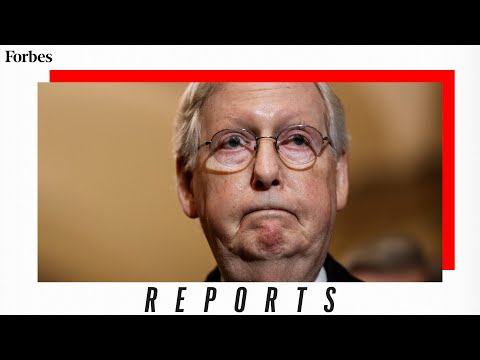Senate Majority Leader Mitch McConnell (R-Ky.) called the October jobs report, which showed the official unemployment rate dropping a full percentage point from September to 6.9%, a “stunning indication” of an economic rebound that signaled why a smaller Covid-19 relief package makes more sense than a larger one. McConnell added that the next bill should be “highly targeted towards things that are directly related to the coronavirus.” Translation: it should exclude some of the Democrats’ priorities.
House Speaker Nancy Pelosi (D-Calif.), who has for months bargained unsuccessfully with the Trump administration in pursuit of an agreement on the next federal aid bill, fired back immediately when asked about McConnell’s support of a smaller, narrower bill. “No, it doesn’t appeal to me at all,” she said at her own Friday press briefing. “This isn’t anything that we should even be looking at. It wasn’t the right thing to do before.”
Pelosi was nodding to the fact that for months, the stalemate in Washington over stimulus legislation has boiled down to the same fundamental disagreement: McConnell wants to see a smaller, targeted relief bill, while Pelosi argues that a bigger, comprehensive package is needed to fully address the needs of the American people and economy, especially when it comes to managing the coronavirus.
Both McConnell and Pelosi have said Congress should pass a bill before the end of the year, but there’s no guarantee that will happen—especially because Democrats, Republicans, and the White House remain far apart on key issues including funding for schools and childcare, changes to certain tax credits, federal unemployment insurance supplements, liability protections for business, and state and local aid (though McConnell indicated Wednesday that he might be willing to make concessions on that last priority of the Democrats).
In March, Congress passed with wide bipartisan support the $2.2 trillion Cares Act, the largest relief bill in American history, to provide emergency aid to individuals, families, and businesses during the pandemic. Experts largely credit that legislation with staving off an economic catastrophe on par with the Great Depression. Since then, lawmakers have been unable to agree on what comes next.
Read the full profile on Forbes: https://www.forbes.com/sites/sarahhansen/2020/11/08/dont-bank-on-a-big-economic-stimulus-from-congress-lame-duck-session/?sh=4292f2f37ba4
Subscribe to FORBES: https://www.youtube.com/user/Forbes?sub_confirmation=1
Stay Connected
Forbes newsletters: https://newsletters.editorial.forbes.com
Forbes on Facebook: http://fb.com/forbes
Forbes Video on Twitter: http://www.twitter.com/forbes
Forbes Video on Instagram: http://instagram.com/forbes
More From Forbes: http://forbes.com
Forbes covers the intersection of entrepreneurship, wealth, technology, business and lifestyle with a focus on people and success.
